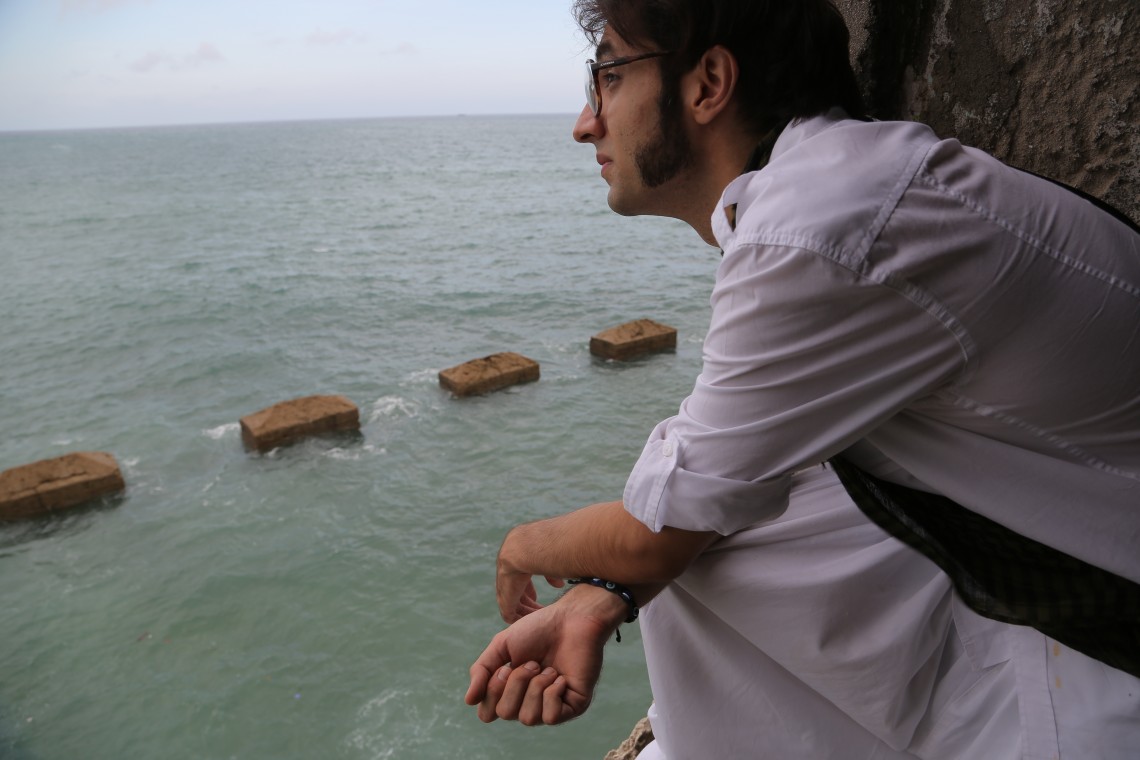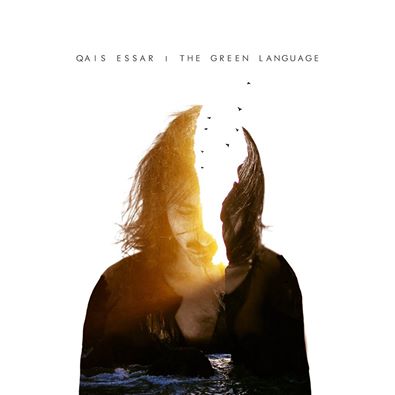
INTERVIEW | Qais Essar Premieres Afghan Rabab Fusion Album ‘The Green Language’
July 2014 | Qais Essar | Humanitarianbazaar.org
THE POINT: Qais Essar premiered his new album THE GREEN LANGUAGE, weaving Afghan classical rabab with world fusion, July 29, 2014. In The Green Language, Essar brings a more modern, sensual, and hungry take on performing rabab for a world audience than we have ever heard before. Humanitarian Bazaar first learned about the music of Qais Essar after the birth of the Sound Central Festival, Afghanistan’s first rock fest, which we helped produce in Kabul in 2011.
We had asked Ariana Delawari and many others to join Sound Central’s Advisory Board to provide advice for founder Travis Beard and the first four post-Taliban rock bands Morcha, Kabul Dreams, District Unknown, and White Page who were forging that new music and arts renaissance in Kabul despite the ongoing war.
When we talked further with Ariana, as well as Fereshta, and Zohra Atash who were producing new albums in the Afghan-American community, we then discovered something rather different, Qais Essar bringing the traditional Afghan rabab into modern music without losing its ancient spicy flavor with his first EP, Zima Afghanistan, in 2012.
We invited Qais Essar, via Ariana Delawari, with tabla artist Neelamjit Dhillon and cellist Robin Ryczek, to feature in the historic and risky Mogadishu Music Festival we produced in Somalia in spring 2013. Performing three shows, Ariana and Qais were among the first international musicians to perform in war-torn Somalia in over two decades. His journey is part of our new feature documentary film, Live from Mogadishu. Now Essar is launching an entirely new quest to bring Afghan rabab to world fusion globally through this new album The Green Language, with his first single Transmutation.
In The Green Language, Essar brings a more modern, sensual, and hungry take on performing rabab for a world audience than we have ever heard before.
DANIEL: First, Qais, much respect for producing these new Afghan-international soundscapes and then joining our risky mission to wield music to persuade youth away from violence in Somalia on top of all that. Your music, as well as your production talents with QAISSAR LLC, fit really well with our alliance of frontline music. Can you tell us, what is the most surprising, innovative thing we can expect from THE GREEN LANGUAGE? What are you trying to achieve?
QAIS ESSAR | PERFORMER, PRODUCER, QAISSAR LLC: Thanks Daniel. As far as the innovation, THE GREEN LANGAUGE has the Rabab in never before heard or seen settings, in context that is truly revolutionary. The Rabab has been dated back 2500 yrs, at the very least, and since then, has stayed within the borders and boundaries of eastern folk and classical music.
My goal is to take this ancient instrument and usher it into the 21st century, to make it more accessible to a new generation and to those that may not been so keen (at first) to a more purist approach to the Rabab. I would not like to think of THE GREEN LANGUAGE as a fusion of, but more of a perfect amalgamation of both eastern classical and western classical and contemporary, where one part is dependent on the other, blended in perfect harmony.
Pretentious? No. Ambitious? Sure. If you want to focus on just the Afghan aspect, Afghani music has been so grossly off course and on the decline for the past 30 years- “modernization” attempts have basically brought rise to the “casio keyboard monster”, this all-in-one juggernaut that has taken place of any real instruments and talent.
The same recycled songs, over and over again. These performers, prey on nostalgia, and use that that to their advantage, where more of their sets are hits by legends long gone.
I was very glad to see the bands post-Taliban start to show up in Kabul, the counterculture underground, starting with Kabul Dreams’ “Sadae Man”, and later other bands that I discovered that offered another option to the mainstream rubbish. To maintain the beauty and integrity of the Rabab and the classical tradition, but to also present it in a modern perspective, that’s the challenge that I humbly accept.
DANIEL: Can you describe the music for those new to these genres and what are some tracks we should look for which distinguish your new sound?
QAIS: I think what made me gravitate toward music initially, and even now to a degree is, or, was my lack of eloquence, so any description may not do it justice. My background is one of Afghan/Indian classical music, so that’s something that’s always prevalent in the music that I create, and in performance, though one may not seem to think so in a “fusion” (for lack of a better term) setting. At the same time, I studied western classical music as well growing up.
If anything, this record can be described as a marriage of the two, borrowing from both traditions, heavily influenced by the late 20th century American minimalist composers such as Steven Reich and Terry Riley, at the same time inspired by those who pioneered the genre of “East meets West”, like Ustaad Aashish Khan with his group Shanti or John Mclaughlin and Ustad Zakir Hussain’s Shakti.
I love the Radio Kabul Orchestra recordings from the 60’s and 70’s, all these indigenous instruments, playing together and creating this huge lush sound. Let’s just call it that, Qais’ dream Radio Kabul Orchestra, 2.0.content here.
DANIEL: Wait, what’s a rabab again, and how is it different from a dalrabab, sitar, tabla, coconut, and pineapple? How did you come to work with these pioneer Ustads? What other musicians do you regularly perform and record with?
QAIS: The Rabab, is a roughly a 2500 year old lute instrument that was born in central asia, and it predates the tabla and sitar and many of these other instruments that you are probably more familiar with. I have also considered myself extremely blessed to have had the opportunity to sit with and learn from so many amazing Ustads and Pandits and I can only hope that I do those that came before me justice through my work and my efforts.
My live shows, if purely classical, will most likely include a tabla player, and on occasion, a duet partner. The team of musicians that I work and record with is super talented, and thanks to the advent of high speed internet, they are around the world. As far as pineapple and coconuts, I find the rabab just as refreshing on a warm day.
DANIEL: How does your music fit in, maybe between the Afghan and West Asian pop vs. classical vs. alternative music movements.
QAIS: I would like to think that it fits right in the middle, a place that people from both movements can meet and appreciate what they have in common. I want to be the serene place on a ven diagram where A and B cross over.
DANIEL: How was Afghan traditional music effected by the Taliban and other extremist’s efforts to ban non-religious music in their territories?
QAIS: Music was banned and instruments were buried. Taliban are smart, I don’t think they banned music for religious reasons as they claimed. I believe it is because historically, music has played such a prominent role in revolutions, be it Bob Dylan or be it old slave spirituals, music has the power to lend weight to the opposition, bolstering hope and moral. By banning music you are essentially clipping the wings of the populace, thus making dictatorship and occupation much easier.
DANIEL: How can people download your music and see you performing?
QAIS: THE GREEN LANGUAGE is available for pre-order on amazon as of now, and by its release date on 7/29, it will be available wherever music is streamed (ie itunes etc), and on my website (www.therabab.com). My collaborative efforts with other groups are also available online as well. To catch me live, you can check out my website for dates, and/or Facebook (https://www.facebook.com/kqaisessar) which I can update from my iPhone. God I love technology, always and forever.
DANIEL: Any advice for people forging their way through an ancient art against great obstacles like you’ve faced?
QAIS: I always tell people the same thing- this recipe calls for: hustle, no ego, perfecting your craft, pure intention, and patience. Bake at 375 for 45 min. This, this is the key to the kingdom.
DANIEL: Right on, brother. Thanks, Tashakor.
TASHAKOR! THANK YOU!


